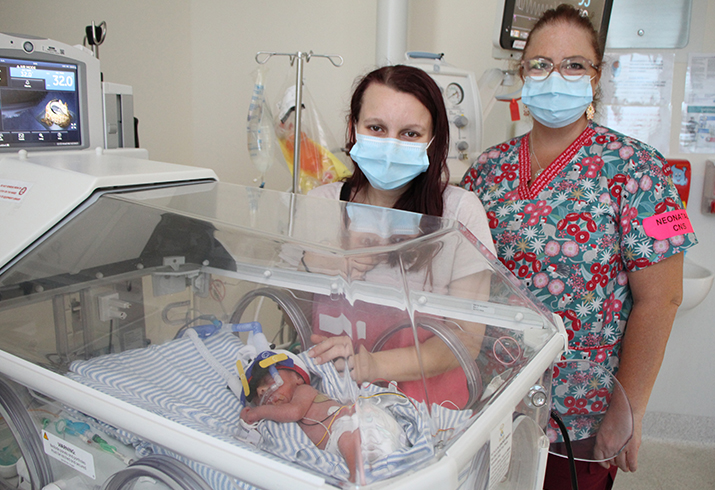Donor milk helps preterm baby Xander
 Mum Leticia with 4-day old baby Xander and FSH NICU clinical nurse specialist Danielle Green
Mum Leticia with 4-day old baby Xander and FSH NICU clinical nurse specialist Danielle Green
Baby Xander was born premature at 30 weeks following an emergency caesarean section.
His mum Leticia’s pregnancy had taken an unexpected turn with an antepartum haemorrhage.
Xander, who was born in Fiona Stanley Hospital’s maternity unit in December, was taken to FSH’s 24-bed neonatal intensive care unit (NICU) for immediate care.
Weighing only 1670 grams, he was unable to spend the first hours of his life breastfeeding.
With infant formula posing a risk to premature Xander, and Leticia still building her own milk supply, FSH was able to give Xander pasteurised donor human milk (PDHM) – a lifesaving food for preterm babies.
FSH provides specialist care for women with significant medical and surgical conditions to deliver their babies. It is also the only hospital in Western Australia with co-location of a NICU, tertiary obstetric services and adult intensive care unit.
Head of Service Neonatology, Dr Mangesh Deshmukh, said with FSH increasing the acceptance of earlier term babies from 28 weeks gestation last year, the provision of PDHM had been a major development in the provision of excellent care for preterm infants.
“FSH NICU is only the second facility in WA to have PDHM available to enhance the care of premature babies,” Dr Mangesh said.
“PDHM is important when the supply of a mother's breastmilk is limited, and previously these babies were given prolonged periods of intravenous parenteral nutrition or required transfer to other hospitals.
“Breast milk is important for all babies, irrespective of their gestation, for its nutritional value, essential antibodies and antioxidants, and long-term health benefits.
“However, it is particularly important for infants born prematurely who are at higher risk of necrotising enterocolitis (NEC).
"As the most common gastrointestinal emergency in very premature babies, NEC is an inflammatory condition of the gut that can result in a need for surgery, long-term brain injury or death.
“PDHM reduces the risk of NEC compared to the use of formula feeding in very premature babies.”
Thanks to generous donor mothers, FSH has been able to access PDHM from Australian Red Cross Lifeblood, who collect, test and pasteurise the donor milk for the safety of premature infants.
“Lifeblood provides one of the safest blood supplies in the world to Australian hospitals, and the same expertise is applied to milk,” Lifeblood’s Milk Bank Manager Chris Sulfaro said.
“This includes donor selection criteria, donor blood tests, hygiene standards during collection, and cold storage of the milk including during transport.”

Leticia said she was very glad and relieved Xander could receive the donor milk while she increased her own milk supply to be able to breastfeed him.
“I’m just so grateful that Xander has this incredible, lifesaving care so close to home,” she said.
Dr Mangesh said premature babies like Xander could now be cared for locally without the need to transfer hospitals.
“The entire team at FSH needs to be congratulated on achieving this important milestone,” he said.


